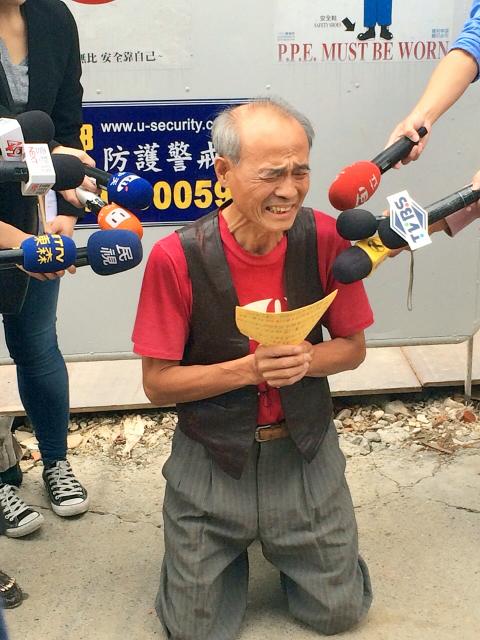The Taipei Department of Urban Development yesterday said that a construction company’s demolition of a privately owned building was carried out in accordance with legal procedures as part of a private urban renewal project approved by the Taipei City Government.
Pacific Construction Co on Friday sent three excavators to a site on Tingzhou Road (汀州路), and in just two minutes tore down a house owned by Luo Chin-kuang (羅進光).
The urban renewal project involved 80 landowners, and Luo was the only one to oppose to it.

Photo: Hsiao Ting-fang, Taipei Times
All the other homes had already been demolished.
Luo had previously said that his house’s location had been determined according to feng shui principles, and that demolishing it would bring Taiwan bad luck.
Luo emerged from his home at noon and, kneeling down, he read from a prepared statement, pleading to President Ma Ying-jeou (馬英九) and Taipei Mayor Ko Wen-je (柯文哲) to help protect his land.
He said that he would not file any charges against the construction company.
Department head Lin Jou-min (林洲民) told reporters that the demolition had been carried out lawfully on a permit issued by the city government in April last year.
Citing the Urban Renewal Act (都市更新條例), Lin said that the project was approved after gaining the backing of 60 percent of property owners who together owned more than two-thirds of space allocated for the project.
Contractors for urban renewal projects should reach agreements with all stakeholders because tearing down homes could lead to social unrest, Lin said.
At a separate setting, Ko, who has previously met with Luo, said that he was surprised to learn that Luo did not know of the demolition in advance, “and I did not know it either.”
While the city had issued a demolition permit to the construction firm, “I would expect them to talk to the home owner before flattening the house,” Ko said, adding that he would try to come up with a solution that is acceptable to everyone.
“If he [Luo] insists, we could try to find a way for him to have peace of mind in designing the building,” Ko said.

CHANGING LANDSCAPE: Many of the part-time programs for educators were no longer needed, as many teachers obtain a graduate degree before joining the workforce, experts said Taiwanese universities this year canceled 86 programs, Ministry of Education data showed, with educators attributing the closures to the nation’s low birthrate as well as shifting trends. Fifty-three of the shuttered programs were part-time postgraduate degree programs, about 62 percent of the total, the most in the past five years, the data showed. National Taiwan Normal University (NTNU) discontinued the most part-time master’s programs, at 16: chemistry, life science, earth science, physics, fine arts, music, special education, health promotion and health education, educational psychology and counseling, education, design, Chinese as a second language, library and information sciences, mechatronics engineering, history, physical education

DEADLOCK: As the commission is unable to forum a quorum to review license renewal applications, the channel operators are not at fault and can air past their license date The National Communications Commission (NCC) yesterday said that the Public Television Service (PTS) and 36 other television and radio broadcasters could continue airing, despite the commission’s inability to meet a quorum to review their license renewal applications. The licenses of PTS and the other channels are set to expire between this month and June. The National Communications Commission Organization Act (國家通訊傳播委員會組織法) stipulates that the commission must meet the mandated quorum of four to hold a valid meeting. The seven-member commission currently has only three commissioners. “We have informed the channel operators of the progress we have made in reviewing their license renewal applications, and

The High Prosecutors’ Office yesterday withdrew an appeal against the acquittal of a former bank manager 22 years after his death, marking Taiwan’s first instance of prosecutors rendering posthumous justice to a wrongfully convicted defendant. Chu Ching-en (諸慶恩) — formerly a manager at the Taipei branch of BNP Paribas — was in 1999 accused by Weng Mao-chung (翁茂鍾), then-president of Chia Her Industrial Co, of forging a request for a fixed deposit of US$10 million by I-Hwa Industrial Co, a subsidiary of Chia Her, which was used as collateral. Chu was ruled not guilty in the first trial, but was found guilty

Taiwan People’s Party (TPP) Chairman Huang Kuo-chang (黃國昌) yesterday appealed to the authorities to release former Taipei mayor Ko Wen-je (柯文哲) from pretrial detention amid conflicting reports about his health. The TPP at a news conference on Thursday said that Ko should be released to a hospital for treatment, adding that he has blood in his urine and had spells of pain and nausea followed by vomiting over the past three months. Hsieh Yen-yau (謝炎堯), a retired professor of internal medicine and Ko’s former teacher, said that Ko’s symptoms aligned with gallstones, kidney inflammation and potentially dangerous heart conditions. Ko, charged with